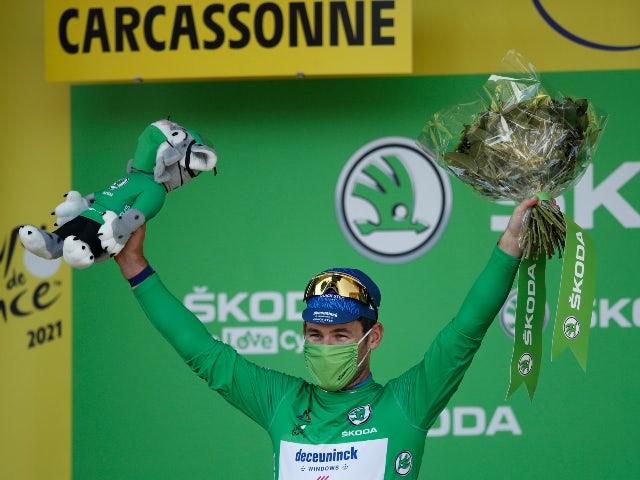Mark Cavendish etched his name deeper into Tour de France history on Friday as he won his 34th career stage to match the record of the great Eddy Merckx.
Thirteen years to the day after winning his first stage in Chateauroux, Cavendish celebrated a milestone victory in Carcassonne that cements his status as the greatest sprinter the race has ever seen.
But more than that, the victory continued a remarkable sporting comeback as a rider who feared his career was over in the winter won his fourth stage of this year’s Tour to match a record which had felt out of reach during the struggles of recent years.
The win moves Cavendish level with the Belgian Merckx, a five-time overall winner of the Tour, who took the last of his stage wins in 1975.
But to get this far Cavendish has had to overcome demons on and off the bike since four wins in the 2016 Tour took him to 30 in his career.
🦅 An aerial view of 🇬🇧 🇮🇲 @MarkCavendish's 34th win 💚 🦅 Une vue aérienne de la 34ème victoire de 🇬🇧 🇮🇲 @MarkCavendish 💚#TDF2021 pic.twitter.com/zLO3Sjw7aQ — Tour de France™ (@LeTour) July 9, 2021
Battles with injury and the Epstein-Barr virus in turn led to Cavendish revealing he had been diagnosed with depression in 2018, but he has fought to extend his career and is now enjoying considerable spoils.
“I haven’t realised it,” said Cavendish. “It’s still just another win on the Tour de France. It’s like my first one. I’ve won a stage of the Tour de France. It’s what I dreamed of as a kid and it’s what I dream of now.

“I’ve worked so hard for it. We’ve seen such a growth, especially in the UK, of cycling since I’ve started racing here at the Tour de France.
“If any one of my wins can inspire the kids to ride the Tour de France or the Tour de France Femmes from next year when they grow up, that’s what means the most to me I think.”
Merckx, ‘the Cannibal’ who devoured victories and opponents alike on all terrains, was a very different rider from a different era of the sport, but his status only elevates the importance of the records he holds.
“I don’t think I can ever be compared to the great Eddy Merckx, the greatest ever road cyclist of all time,” Cavendish said.
how it started how its going pic.twitter.com/JmTySbi2on — Tour de France™ (@LeTour) July 9, 2021
“But I think to equal the number of stage victories, it’s something that somebody who doesn’t follow cycling a lot can understand and put into perspective, I guess.”
The 220km stage from Nimes had been marked as a day for the breakaway but would instead come down to a bunch sprint in the citadel as Cavendish’s Deceuninck-QuickStep team worked all day to control the peloton.
The unrelenting heat, long distance and slight drag up to the line all counted against Cavendish, but having already established himself as the pick of the reduced sprinting field here, he came good once again and strengthened his grip on the points leader’s green jersey in the process.

Such was the strength of his Deceuninck-QuickStep team that Cavendish’s own lead-out man Michael Morkov took second ahead of Jasper Philipsen.
“My team deliver me every single time,” Cavendish said. “That puts pressure on me…sometimes it can be hard, especially if I don’t feel great, but when things like that happen today, 1-2 with your lead-out man in the Tour de France, that’s pretty special, that’s a nice one.
“It was one of the hardest but that’s a memorable one.”
If he can stay safe through the mountain stages to come, the Manxman should have two more opportunities to take the record outright, first on stage 19 into Libourne and then on the final day on the Champs-Elysees in Paris.
#TDF2021 UPDATE: Unfortunately due to the crash, @SimonYatess has been forced to abandon stage 13 of @LeTour. He will be assessed by our team doctors and we will provide an update later. — Team BikeExchange (@GreenEDGEteam) July 9, 2021
The sprint finish meant there were no major changes in the general classification, with Tadej Pogacar continuing to lead by five minutes 18 seconds from Rigoberto Uran.
But while Cavendish celebrated, fellow Brit Simon Yates saw his race ended after he was caught in a high-speed crash inside the final 65km of the stage.
The 28-year-old, using the Tour to prepare for the Tokyo Olympics and eyeing Sunday’s stage close to his home in Andorra, briefly remounted before pulling out of the race.
Team BikeExchange later said Yates had suffered “trauma to his abdominal wall” but that scans showed no fractures or internal injuries.








